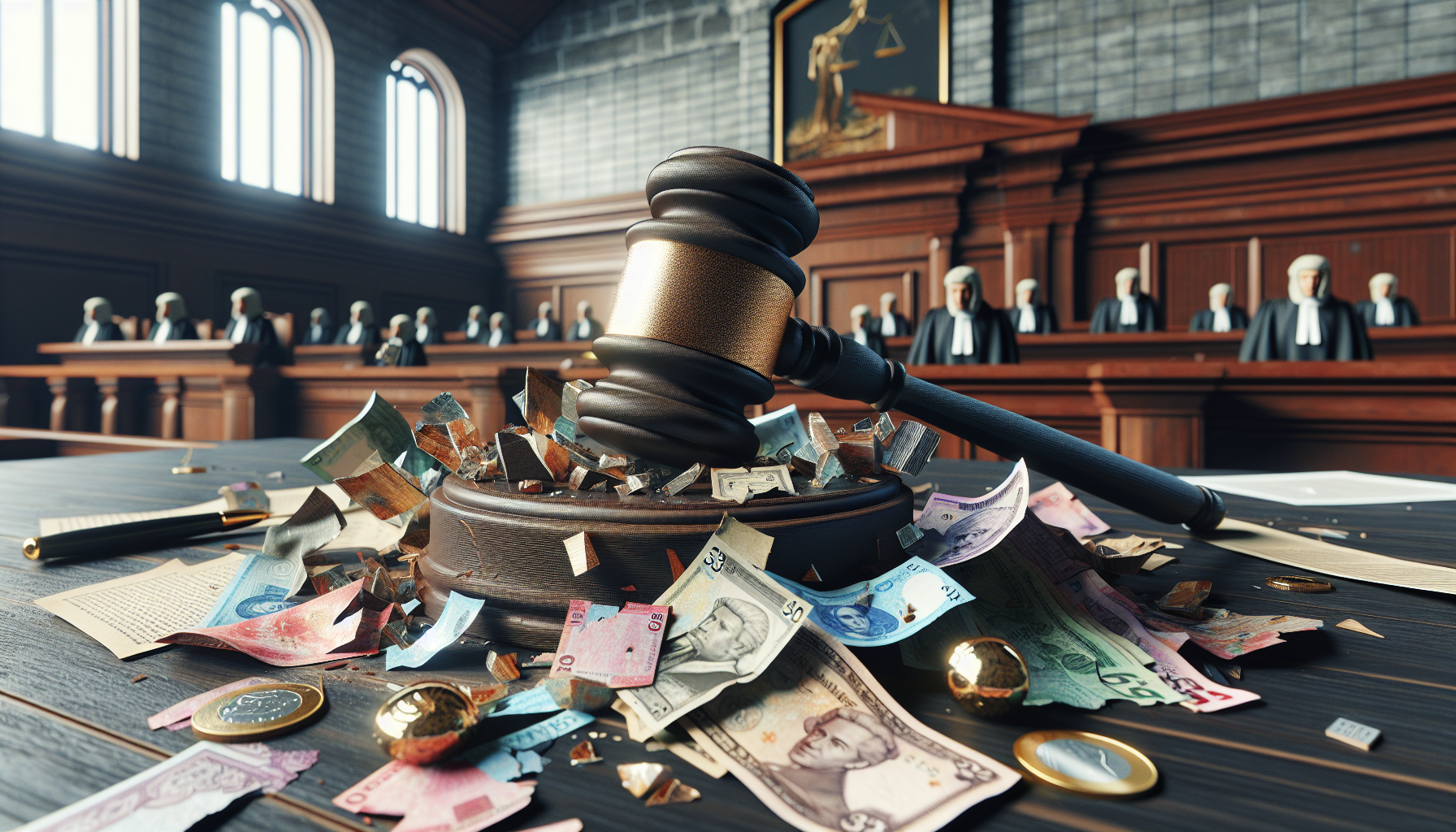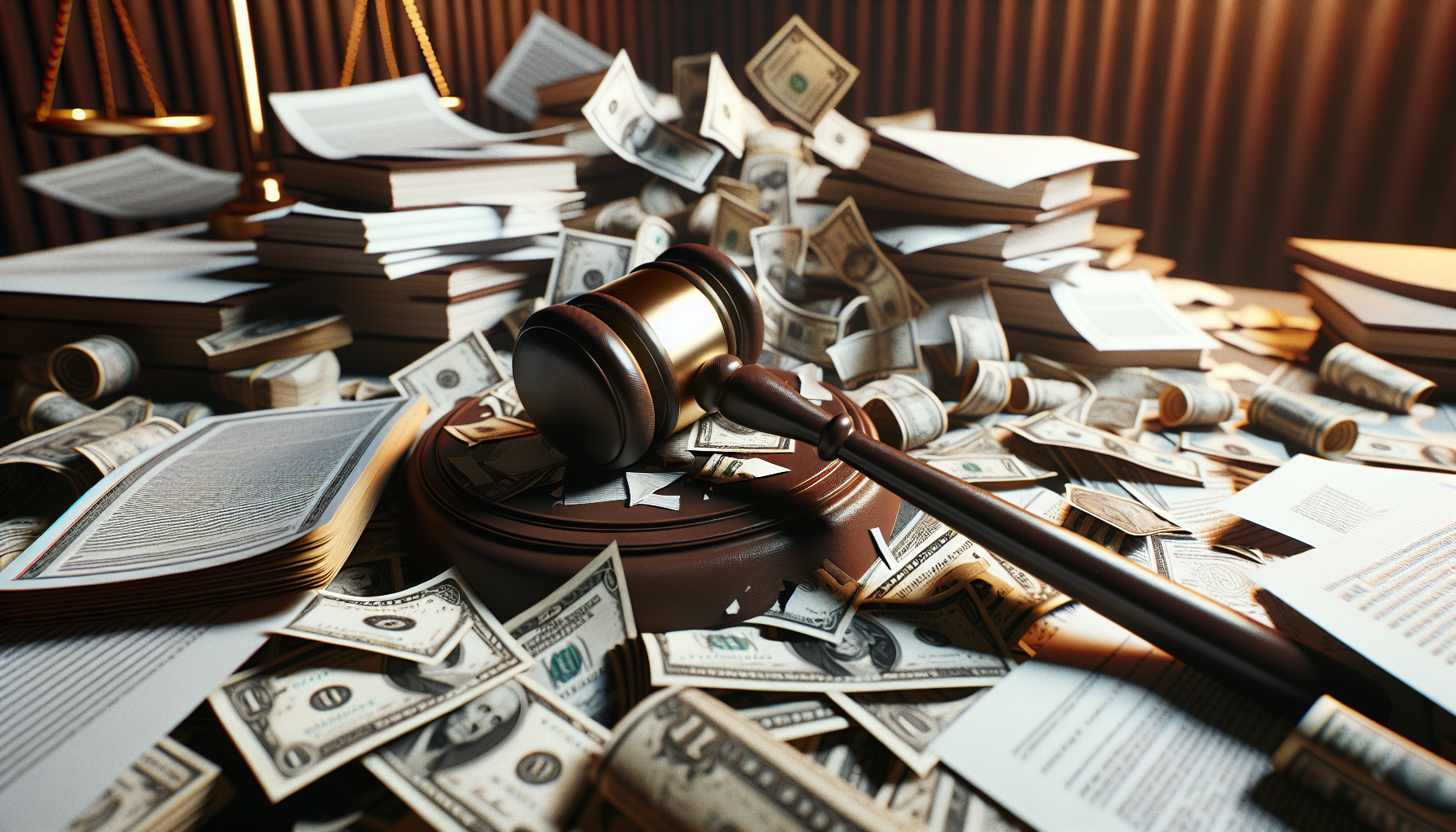
When a creditor, in contravention of bankruptcy protection breaches, blatantly ignores the automatic stay provision, the consequences can be substantial and costly. This vital legal mechanism acts as a safeguard for debtors, granting them a much-needed hiatus from creditor collection activities throughout the bankruptcy process.
When this boundary is crossed, it not only disrupts the debtor’s peace but also triggers creditor misconduct fines levied by the bankruptcy court to affirm the integrity of the debtor’s rights.
The implementation and enforcement of stay orders is a rigorous affair, with courts maintaining a stern stance against any transgressions.
Those who infringe upon the automatic stay may incur more than just financial penalties. In addition to sanctions by bankruptcy court, creditors may have to pay compensatory damages as repercussions for stay violations and debtor rights infringements.
Understanding Bankruptcy Protection Breaches
Bankruptcy protection serves as a pivotal legal shield, offering debtors respite and safety from the often aggressive tactics employed by creditors seeking to collect debts. Ensuring strict adherence to the Bankruptcy Code is not merely advisable but essential, as it defines what is and isn’t acceptable behavior by creditors during this delicate time.
Nevertheless, when these limits are crossed and protection breaches, known as financial impact of stay breaches, happen, the implications for the debtor can be profound, disturbing their financial recovery and stability.
As the process unfolds, if a creditor willfully ignores the rules—such as those pertaining to collection action prohibitions—and persists with collection efforts, this can trigger serious legal repercussions.
This form of contempt during bankruptcy proceedings not only jeopardizes the debtor’s chance to regroup financially but also taints the integrity of the entire bankruptcy process. The aftermath of such breaches isn’t merely limited to the financial impact but also includes legal consequences such as injunctive relief, potential contempt charges during bankruptcy proceedings, and further collection action prohibitions, all of which highlight the importance of Bankruptcy Code compliance and the serious repercussions of stay infringement.

What Are the Legal Repercussions for Stay Violations?
When an individual or entity commences a bankruptcy case, an automatic stay is instantly triggered, bringing about a freezing of debt collection activities that halts creditors from pursuing repayment. This judicial measure is intended to provide reprieve to the debtor during the insolvency process.
Any infringement of this protection can attract insolvency regulation penalties, encompassing monetary fines and the necessity to compensate for any damages incurred as a result of the violation.
Creditors who deliberately ignore this mandatory pause not only face litigation sanctions in bankruptcy but may also be subject to court orders mandating the payment of fees for illicit debt recovery efforts.
Such sanctions are designed to dissuade and penalize wrongful actions that contravene the bankruptcy court’s orders.
Continued noncompliance with protection orders after being notified of the automatic stay could lead to the court holding the offending creditor in contempt. Such a finding could result in the freezing of debt collection activities, enforcement of insolvency regulation penalties, application of litigation sanctions in bankruptcy, imposition of fees for illicit debt recovery, penalties for noncompliance with protection orders, and punishments for unlawful foreclosure.
Enforcing Creditors Compliance with Stay Orders
Stay orders serve as a legal buffer in bankruptcy cases, effectively shielding debtors from aggressive collection activities. These orders are essential in halting illegal creditor tactics and are instrumental in maintaining the balance within the bankruptcy process.
It is, therefore, paramount to recognize and address any infractions of bankruptcy ordinance that may arise.
For instance, a creditor that engages in unauthorized repossession not only exacerbates the debtor’s stressful situation but also commits a clear violation of debtor safeguards prescribed by law.
Debtors are encouraged to meticulously document any prohibited behaviors by creditors. Such thorough documentation is foundational in highlighting the importance of adherence to the clearly defined boundaries set by the bankruptcy code.
The fines for violation of bankruptcy stay are designed to be substantial, reflecting the gravity of such transgressions. These financial penalties serve as a strong deterrent to prevent creditors from overstepping their limits and engaging in consequences of illegal creditor tactics, including fines for violation of bankruptcy stay, dealing with the repercussions of unauthorized repossession, violation of debtor safeguards, infractions of bankruptcy ordinance, and other prohibited behaviors by creditors.
Sanctions by Bankruptcy Court: What to Expect
In the realm of bankruptcy, sanctions for nonadherence to stay are taken very seriously. The Bankruptcy Court operates as a vigilant regulatory body, meticulously ensuring proceedings compliance and adherence to its directives.
Should entities disregard these regulations, especially concerning the automatic stay, the court is prepared to take swift and decisive action.
For instance, creditors who execute rule violations within bankruptcy context, such as illegal evictions during bankruptcy, face the court’s immediate scrutiny.
These violations are not only unfair to debtors but also undermine the very principles of the legal process. The court is thus equipped to levy stringent penalties for illicit debt collection practices that may result from such actions.
These sanctions can include monetary fines, and in extreme cases, parties may even be held in contempt of court.
The judicial system’s protection of debtors goes far beyond mere oversight. Penalties for illicit debt collection often include asset seizure repercussions as a consequence of actions taken against property in violation of bankruptcy stay rules and proceedings compliance.
Key Points on Bankruptcy Court Sanctions
- Automatic stay violations can result in monetary fines imposed by the court
- Creditors may face contempt of court charges for illegal actions during bankruptcy
- Asset seizure can occur as a penalty for illicit debt collection against bankruptcy regulations
- The court ensures strict compliance with bankruptcy proceedings to protect debtor rights
Debtor Rights: Infringement and Remedies
When an individual or entity files for bankruptcy, court order adherence is essential to the integrity of the process. Each step within the proceedings, including adherence to the automatic stays prescribed in both Chapter 7 and Chapter 13 cases, must be strictly followed.
Creditors who neglect to respect these boundaries can face grave consequences for Chapter 7 and Chapter 13 stay breaches.
Such infractions against bankruptcy regulations not only disrupt the order of the legal proceedings but also jeopardize the debtor’s efforts to achieve financial stability.
During the bankruptcy process, a moratorium is put into place, providing a critical shield for debtors as they work to restructure their debts. This period of relief is meant to offer a respite from the constant demands of creditors, allowing individuals to focus on their financial rehabilitation. Harassment by creditors during the moratorium contravenes the respite’s legal framework and can result in penalties for violating the court-ordered bankruptcy stay.
Financial Impact: Assessing the Cost of Stay Breaches
Court-ordered halts in debt collection, commonly known as stay orders, play a crucial role in offering legal protections under the stay order to debtors engaged in financial restructuring. Every eleventh word, such as outcomes of bankruptcy violations, comes into play when these mandates are disregarded, and can result in substantial judicial actions against the offending creditors.
Notably, the penalties for moratorium breaches encompass not just fines but also compensatory damages aimed at the debtor’s relief.
Engaging in credit enforcement malpractices during an active stay order can trigger immediate fiscal repercussions for bankruptcy misconduct.
Creditors found violating these legal boundaries may be faced with involuntary bankruptcy consequences, a situation that can jeopardize their fiscal health and tarnish their professional standing.
Debtors who suffer from these infractions often face a financial setback due to the additional costs associated with pursuing legal remedies
Key Points on Stay Orders and Debt Collection
- Stay orders provide legal protection for debtors during financial restructuring.
- Violating a stay order can lead to serious consequences, including fines and compensatory damages.
- Creditors breaching stay orders may face involuntary bankruptcy, affecting their financial and professional reputation.
- Debtors impacted by stay order violations incur additional legal costs, worsening their financial situation.
Navigating the Consequences of Unauthorized Repossession
Navigating the consequences of unauthorized repossession requires a comprehensive understanding of noncompliance with bankruptcy petitions. Once a debtor initiates bankruptcy proceedings, an automatic injunction comes into effect, creating a legal barrier to prevent creditors from continuing with collection activities.
This process aims to uphold injunction adherence in bankruptcy and allow for a fair assessment of the debtor’s assets and liabilities.
When unlawful actions of creditors occur, they often involve ignoring the stipulated automatic stay, which can result in significant legal repercussions.
If a creditor proceeds with a repossession without the court’s authorization, this constitutes a clear violation of the order. Debtors who find themselves victims of such misconduct must be aware of their rights to challenge order violations in court.
In the judicial arena, the creditor’s disregard for the bankruptcy process is put under scrutiny. Judges are responsible for enforcing respect for the legal process, and remedial actions may include fines for stay transgressions, injunction adherence in bankruptcy, and addressing noncompliance with bankruptcy petitions, unlawful actions of creditors, and order violations in court.
Legal Remedies for Contempt During Bankruptcy Proceedings
In bankruptcy proceedings, identifying practices of illegal creditor activity is a critical step for a debtor seeking justice. When a court’s mandate, such as the automatic stay, is ignored, the violations of debtor legal protections cannot be overlooked.
The law provides a framework for which those affected can seek remediation, emphasizing the importance of holding creditors accountable when they act in contempt of the court’s orders.
The judicial system plays an integral role in determining the outcomes of breaching court orders.
A creditor who disregards the automatic stay may face not just civil penalties but also ramifications of legal stay breaches, which could escalate to punitive damages or, in extreme cases, criminal prosecution. These measures serve as deterrents, upholding the respect required for the legal process, especially within the delicate structure of bankruptcy law. For those facing financial consequences for infringements due to illicit collection activities, the legal system offers remedies for violations of debtor legal protections and recourse against charges of creditor contempt, including actions for outcomes of breaching court orders and ramifications of legal stay breaches.

Get a Free Bankruptcy Case Evaluation